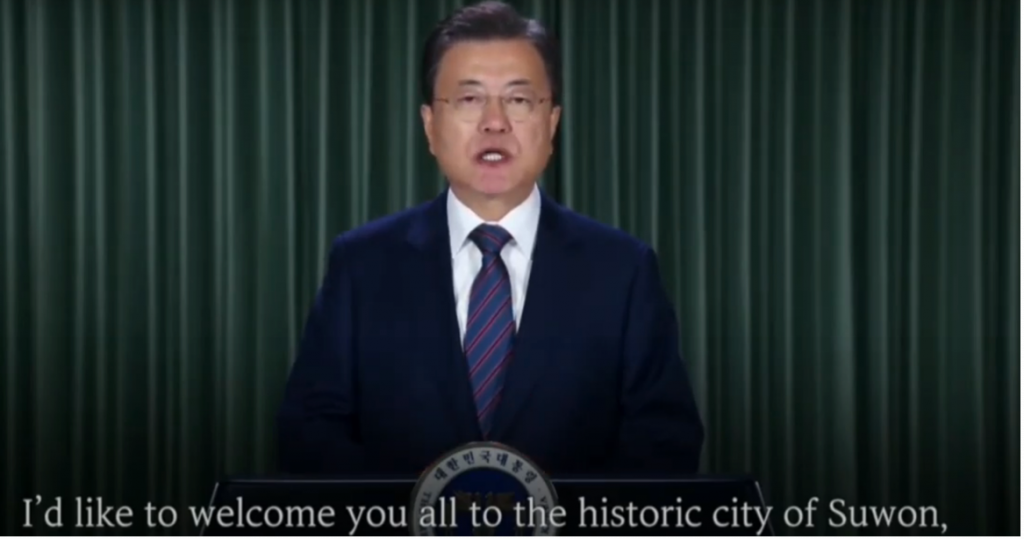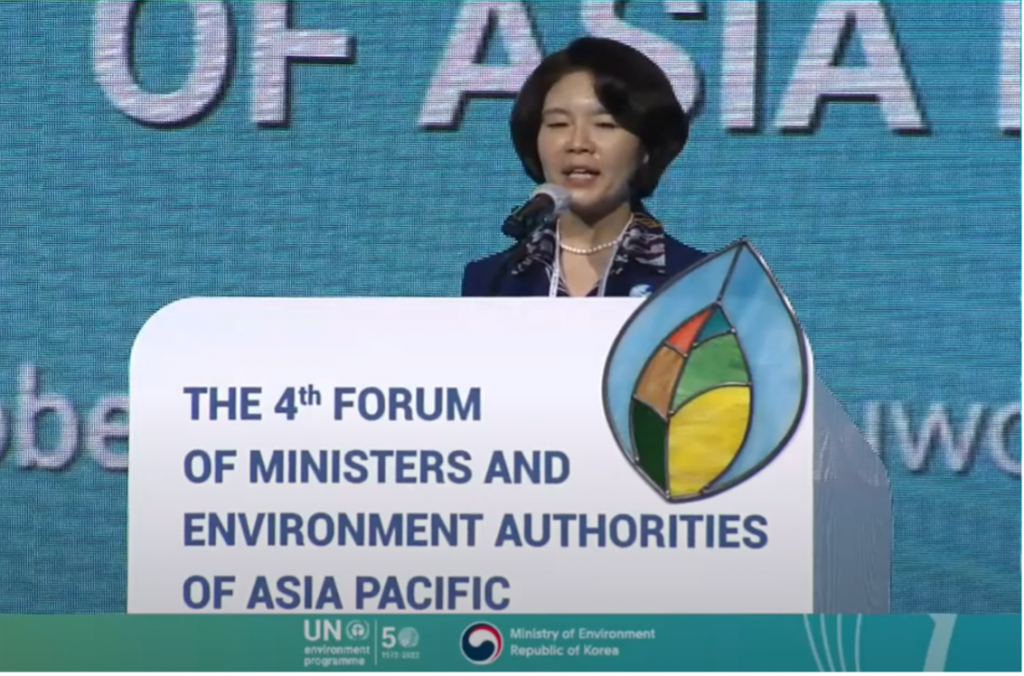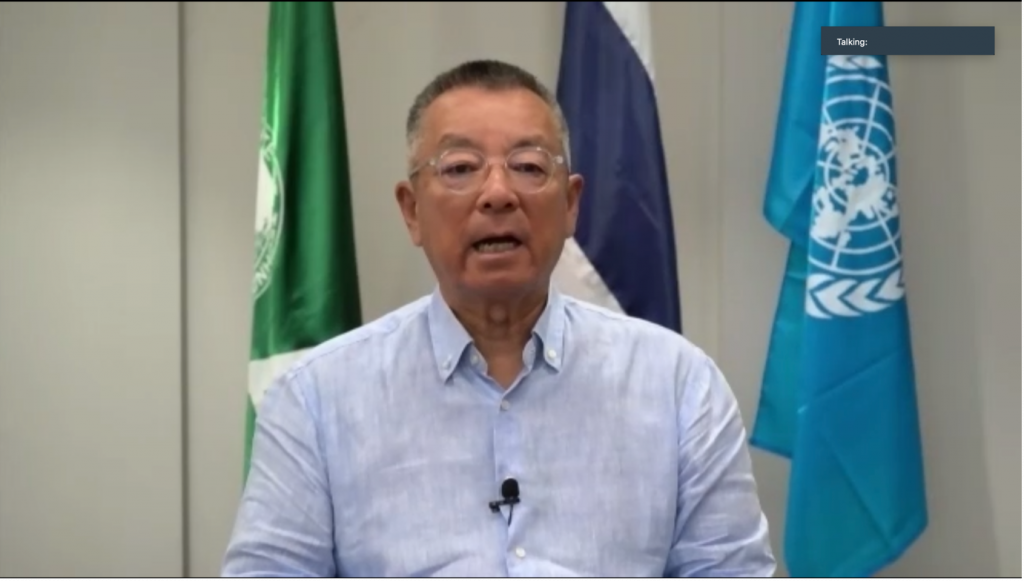By Nitipol Kiravanich
October 6th, 2021 — The Asian Institute of Technology, recognized among ministries and authorities for its role in environment in the Asia Pacific region, took part in the Fourth Forum of Ministers and Environment Authorities of Asia Pacific to highlight critical role universities play in achieving SDGs.
The two-day Fourth Forum of Ministers and Environment Authorities of Asia Pacific was held on October 6th – 7th, 2021 as a hybrid event with participants participating online and on-site at Suwon Convention Center, Suwon City, Republic of Korea. The forum was jointly organized by the Ministry of Environment of the Republic of Korea and the United Nations Environment Programme (UNEP). Over 400 delegates from governmental and international organizations, including the Asian Institute of Technology (AIT), represented by President Dr. Eden Woon, participated in the event.
AIT President Dr. Eden Woon made a statement on the critical role universities play in the Sustainable Development Goals (SDGs) — AIT is constantly striving for solutions and recommendations on world critical matters to the UN agencies throughout the years.
The Forum embodied process of consultation on a draft political declaration, addressing the theme of the fifth session of the United Nations Environment Assembly ‘Strengthening Actions for Nature to Achieve the Sustainable Development Goals in Asia and the Pacific’, also served as a platform for the Member States and other stakeholders to contribute regional perspectives to the resumed fifth session of the United Nations Environment Assembly -- UNEA-5.2 which is to be held from 28 February to 2 March 2022 as well as to the Special Session of the United Nations Environment Assembly to mark the 50th anniversary of UNEP on 3-4 March 2022 in Nairobi, Kenya. In regard, the main objective is to develop a joint vision and achievable actions to address the theme.

At the opening of the ceremony of the forum (7th October), a recorded video of President of Republic of Korea H.E. Moon Jae-in was displayed, where he emphasized the importance of coexisting with nature and galvanizing the international cooperation of achieving sustainable development. The President of Republic of Korea hoped this forum will serve as exemplary to promote global solidarity. “The top priority we have to accomplish to coexist with nature in a harmonious manner is to overcome the climate crisis,” President of the Republic of Korea urged.

In the opening remarks, H.E. Han Jeoung-ae, the Minister of Ministry of Environment Republic of Korea luminated on the importance of future generations and their reliability on green energy and carbon neutrality society from the climate crisis, inferring to the chronic global issue that will consequentially affect future generations if not addressed with determination. The Korean Minister of Environment aspired that Asia-Pacific regions can gather together and share consensus wisdom to counter climate change. H.E. went on to say that this presented opportunity for all to overcome the issues in which the answer lies in ‘nature’ stating “we must protect nature and restore it from the damage”. Moreover, she concluded her remarks in response to the Coronavirus Disease (COVID-19) that even though the world is changed as a byproduct of the pandemic encouraging nations that “we must keep the dreams and values”.
This conference where world leaders participated and gather insights for future national development policies, as well as for the UN to develop future frameworks to reach sustainable growth, AIT President Dr. Eden Woon made a statement on ‘Agenda item 3: Regional input to the second session of the 5th United Nations Environment Assembly outcome (UNEA-5.2)’ for the contributions AIT made over six decades of establishment, conveying that AIT strives to produce solutions and recommendations on climate change, water insecurity, food insecurity, air pollution, biodegradation, biodiversity loss, plastic pollution, and many others. With universities and institutions being one of the essentials to the SDGs, President Woon relayed on pushing forward academic programs, research, projects, and outreach activities which are all designed to bolster sustainable development and sustainability, and environmental conservation around Asia and beyond.
 “We have a history of collaboration with UNEP, UNESCO (The United Nations Educational, Scientific and Cultural Organization), UNESCAP (The United Nations Economic and Social Commission for Asia and the Pacific), FAO (The Food and Agriculture Organization), other United Nations agencies, and the like-minded ministries, and partners in the private sector, academia and civil society present today – and I am certain that by joining forces and working closely together we can strengthen our actions to achieve the SDGs in Asia and the Pacific.” The President of AIT underlined the collaboration with UN Agencies.
“We have a history of collaboration with UNEP, UNESCO (The United Nations Educational, Scientific and Cultural Organization), UNESCAP (The United Nations Economic and Social Commission for Asia and the Pacific), FAO (The Food and Agriculture Organization), other United Nations agencies, and the like-minded ministries, and partners in the private sector, academia and civil society present today – and I am certain that by joining forces and working closely together we can strengthen our actions to achieve the SDGs in Asia and the Pacific.” The President of AIT underlined the collaboration with UN Agencies.
Meanwhile, Nations in the Asia-Pacific region also expressed their objectives from their contributions and aim to enhance the SDGs. China underlined the ecological and civilization concept, as well as the commitment for harmonious growth in regards to both humans and nature; Indonesia took focus on Sustainable Cities Programme (SCP) with the notion in the Regional Capacity Center for Clean Seas in Bali; Thailand pointed out challenges as a result from the pandemic, urged to enhance cooperation in eradicating illegal trade in wildlife; Vietnam explained initiatives and plans to its green growth strategy, including on reducing emissions.
Furthermore, Mr. Sveinung Rotevatn, President of the fifth session of the UN Environment Assembly (UNEA-5), who is also the Minister of Environment and Climate of Norway seeks for intergovernmental negotiating committee for global marine litter; plastic pollution for the world to reach sustainable development goals at the resumed fifth session of UNEA-5.2 in February 28th – March 2nd of 2022.
Additionally, the previous three sessions of the Forum of Ministers and Environment Authorities of Asia Pacific were held in Bangkok, May 2015; September 2017; Singapore, January 2019 respectively. The first forum allowed delegates to identified challenges for the region such as air pollution and its health impacts; the need for sound chemicals and waste management for the promotion of the green and blue economies. The second forum reviewed the implementation of sustainable development commitments and presented examples of policy and practice. While the third, discussed implementing solutions to SCP together with delegates’ perspectives on draft UNEA resolutions proposed by Asia-Pacific countries.
---

